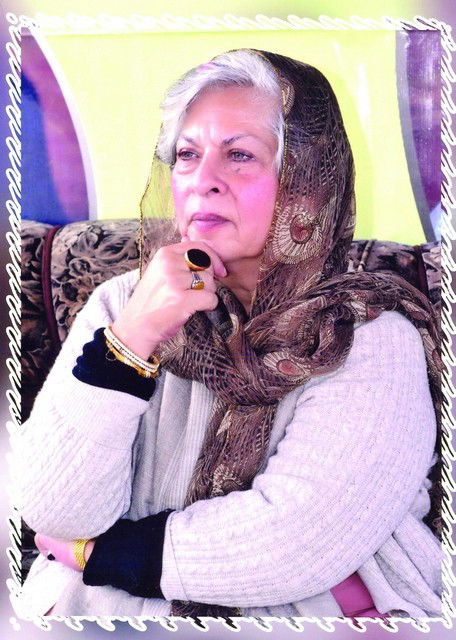Headlines
India-Pakistan relations unlikely to improve: Pakistani politician Syeda Abida Hussain

New Delhi, March 16 Veteran Pakistani politician and former minister Syeda Abida Hussain, who has also served as her country's ambassador to the US, feels that India-Pakistan relations are unlikely to improve any time soon as Modi "would lose his hardcore supporters if he makes gestures of friendliness" towards Pakistan.
"Modi stands for Hindutva and he is a right wing hardliner. It is unlikely that India-Pakistan relations will improve in any meaningful way. Though Sharif is quite genuine in seeking better relations with India, it is not reciprocal," Hussain said in an interview to IANS here.
Abida Hussain, who served as a minister in the Nawaz Sharif government from 1996 to 1999, also dismissed proposals like joint governance in Kashmir, put forward by former Pakistan foreign minister Khurshid Mahmud Kasuri in his recent book.
"It's a ridiculous proposal to try joint governance in Kashmir which has not been tried anywhere in the world and it's not feasible at all," said Hussain , who quit the Sharif government in 1999 after allegations involving power theft.
Hussain asserted that Pakistan's reaction to the Pathankot attack was kneejerk. "Our reaction to Pathankot was hasty and we almost said that we were behind it. Now, inquiries found that we had nothing to do with it. We should have maintained it from the beginning," she claimed adding that Jaish-e-Mohammed chief Maulana Mazood Azhar, whom India accused as the mastermind was never a free man.
"Azhar is not a free man. Wherever he is, he is in custody of the authorities," she said.
India has maintained that the attack was carried out by militants who came across the border and that Pakistan has not done enough to rein in Azhar.
The former minister also scoffs at India's opposition to Washington selling eight F16 jets to Pakistan."Why is India worried about US selling F16 to us? India is a leading buyer of hardware in the world. Why should India protest, while we never opposed India buying weapons?" she asked.
She was here to release her book 'Power Failure: The political Odyssey of a Pakistani Woman,' which traces 45 years of her political journey. Hussain also has the distinction of being the first woman to chair the district council of Jhang.
Hussain also admits that though she had an aristocratic background and family support, she had to push boundaries to hold her place in Pakistan politics as a woman. "There were several hurdles but I have managed to take it in my stride. However, politics is all about opposition, it's a chunk of life and it was challenging." says Hussain, daughter of late Syed Abid Hussain, a prominent name in Pakistan politics.
While the book gives an insider view into the tumultuous political events in Pakistan from Zulfikar Ali Bhutto's rule from early 1970s to the assassination of Benazir Bhutto in 2007, Hussain describes the book as a narrative of missed opportunities.
"Starting from Bhutto, Pakistan had several missed opportunities. If Bhutto had ordered repolls in 1977, we could have avoided a military intervention. It was a missed chance when Prime Minister Junejo took on Zia ul Haq prematurely which led to dissolution of the Assembly in 1985," she said adding that Benazir Bhutto failed to deliver good governance and the country suffered again when Nawaz Sharif failed to handle military succession.
Hussain, who is a member of Pakistan People's Party (PPP) since 2006 having rejoined after leaving it in the 1970s, says that she quit PPP when she wasn't given a seat in general elections.
"Bhutto said that he didn't want a seat to be wasted on women, I found it as a gender bias. Eventually, I came back to PPP when Benazir returned," she says.
She also foresees the resurgence of PPP in five to seven years. "If Bilawal (son of Benazir) works hard, PPP will return to power. He has to grow out from the shadow of his father and reach out to the masses," she says.

5 hours ago
G20 Johannesburg summit calls for improving global governance

5 hours ago
EAM Jaishankar speaks to Ukrainian FM, discusses latest conflict-related developments

5 hours ago
PM Modi holds significant discussions with world leaders during Jo'burg G20 Summit

5 hours ago
US says Russia-Ukraine peace draft made with Moscow's 'input'

5 hours ago
Ukraine, US to hold consultations on peace plan in Switzerland

5 hours ago
Houthi court sentences 18 Yemeni UN aid workers to death for 'spying for Israel'

5 hours ago
Justice Surya Kant to take oath as 53rd CJI tomorrow

5 hours ago
Tejas pilot’s body brought to Coimbatore; IAF personnel pay tearful tribute

5 hours ago
The Third Eye: Strategic significance of transparency

5 hours ago
Gujarat CM changes his programme venue for citizen's wedding in Jamnagar

5 hours ago
'He is daydreaming': DKS dismisses Kumaraswamy's claim of 'explosive political developments' in K'taka

5 hours ago
TN govt brings Cuddalore’s Srimushnam taluk under Cauvery Delta region; over 18,000 farmers to benefit

5 hours ago
Bilateral trade to grow, investment to surge with proposed Israel FTA: Piyush Goyal






















